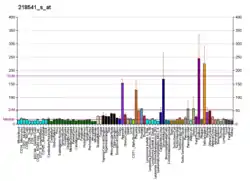TCIM
TCIM is a protein that in humans is encoded by the TCIM gene.[5][6]
Function
This gene encodes a small, monomeric, predominantly unstructured protein (106 amino acids, 12.3 kDa, isoelectric point 9.39).[7] It is a positive regulator of the Wnt / beta-catenin signaling pathway. This protein interacts with a repressor of beta-catenin mediated transcription at nuclear speckles. It is thought to competitively block interactions of the repressor with beta-catenin, resulting in up-regulation of beta-catenin target genes.[6]
References
- GRCh38: Ensembl release 89: ENSG00000176907 - Ensembl, May 2017
- GRCm38: Ensembl release 89: ENSMUSG00000056313 - Ensembl, May 2017
- "Human PubMed Reference:". National Center for Biotechnology Information, U.S. National Library of Medicine.
- "Mouse PubMed Reference:". National Center for Biotechnology Information, U.S. National Library of Medicine.
- Chua EL, Young L, Wu WM, Turtle JR, Dong Q (November 2000). "Cloning of TC-1 (C8orf4), a novel gene found to be overexpressed in thyroid cancer". Genomics. 69 (3): 342–7. doi:10.1006/geno.2000.6348. PMID 11056052.
- "Entrez Gene: C8orf4 chromosome 8 open reading frame 4".
- Kozlowski LP (October 2016). "IPC - Isoelectric Point Calculator". Biology Direct. 11 (1): 55. doi:10.1186/s13062-016-0159-9. PMC 5075173. PMID 27769290.
Further reading
- Bonaldo MF, Lennon G, Soares MB (September 1996). "Normalization and subtraction: two approaches to facilitate gene discovery". Genome Research. 6 (9): 791–806. doi:10.1101/gr.6.9.791. PMID 8889548.
- Sunde M, McGrath KC, Young L, Matthews JM, Chua EL, Mackay JP, Death AK (April 2004). "TC-1 is a novel tumorigenic and natively disordered protein associated with thyroid cancer". Cancer Research. 64 (8): 2766–73. doi:10.1158/0008-5472.CAN-03-2093. PMID 15087392.
- Friedman JB, Brunschwig EB, Platzer P, Wilson K, Markowitz SD (August 2004). "C8orf4 is a transforming growth factor B induced transcript downregulated in metastatic colon cancer". International Journal of Cancer. 111 (1): 72–5. doi:10.1002/ijc.20235. PMID 15185345. S2CID 19983783.
- Jung Y, Bang S, Choi K, Kim E, Kim Y, Kim J, Park J, Koo H, Moon RT, Song K, Lee I (January 2006). "TC1 (C8orf4) enhances the Wnt/beta-catenin pathway by relieving antagonistic activity of Chibby". Cancer Research. 66 (2): 723–8. doi:10.1158/0008-5472.CAN-05-3124. PMID 16424001.
- Kim B, Koo H, Yang S, Bang S, Jung Y, Kim Y, Kim J, Park J, Moon RT, Song K, Lee I (June 2006). "TC1(C8orf4) correlates with Wnt/beta-catenin target genes and aggressive biological behavior in gastric cancer". Clinical Cancer Research. 12 (11 Pt 1): 3541–8. doi:10.1158/1078-0432.CCR-05-2440. PMID 16740781.
- Yang ZQ, Streicher KL, Ray ME, Abrams J, Ethier SP (December 2006). "Multiple interacting oncogenes on the 8p11-p12 amplicon in human breast cancer". Cancer Research. 66 (24): 11632–43. doi:10.1158/0008-5472.CAN-06-2946. PMID 17178857.
- Yang ZQ, Moffa AB, Haddad R, Streicher KL, Ethier SP (September 2007). "Transforming properties of TC-1 in human breast cancer: interaction with FGFR2 and beta-catenin signaling pathways". International Journal of Cancer. 121 (6): 1265–73. doi:10.1002/ijc.22831. PMID 17520678. S2CID 25292320.
- Park J, Jung Y, Kim J, Kim KY, Ahn SG, Song K, Lee I (August 2007). "TC1 (C8orf4) is upregulated by cellular stress and mediates heat shock response". Biochemical and Biophysical Research Communications. 360 (2): 447–52. doi:10.1016/j.bbrc.2007.06.077. PMID 17603013.
External links
- Human C8orf4 genome location and C8orf4 gene details page in the UCSC Genome Browser.
This article is issued from Wikipedia. The text is licensed under Creative Commons - Attribution - Sharealike. Additional terms may apply for the media files.




